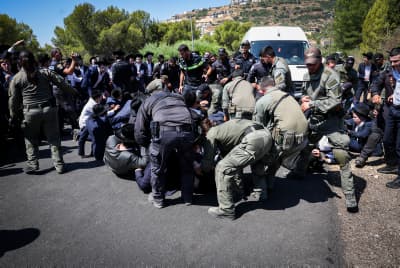IDF, Haredim
When it comes to the IDF, Haredi rabbis are losing control over their followers | Analysis
As the sun sets over Jerusalem's ancient stones, casting long shadows across the city, the Haredi community wonders whether their leaders can find a way to regain their political mojo.

In the heart of Jerusalem, a political earthquake is shaking the very foundations of ultra-Orthodox (Haredi) power. Once kingmakers in Israeli politics, Haredi leaders now find themselves backed into a corner, their influence waning as their way of life comes under unprecedented attack.
The bustling streets of Mea Shearim, usually alive with the sounds of Torah study and children's laughter, now echo with whispers of fear and frustration. Daycare centers are facing cuts, schools are struggling to keep the lights on, and young yeshiva students - once shielded from military service - are being labeled as draft dodgers.
"It's as if our world is crumbling around us," laments Moshe, a 45-year-old father of eight. "We've always relied on our political leaders to protect our way of life. Now, it seems they can't even protect themselves."
Indeed, the political titans of the Haredi world - men like Aryeh Deri of Shas and Moshe Gafni of United Torah Judaism - find themselves in an unthinkable position. They sit in government, yet they're powerless to stop the erosion of their community's interests.
These once-feared political operators can't even muster the threat of toppling the government. The specter of war and national crisis has neutered their usual tactics, leaving them scrambling for relevance.
Desperate times call for desperate measures. In a move that would have been unthinkable just months ago, Deri - the wily veteran of countless political battles - has broken a decade-long boycott to reach out to his old nemesis, Yair Lapid. It's a last-ditch pass, born of sheer desperation.
Meanwhile, the streets are heating up. Outside army recruitment offices, young Haredi men clash with police, their payot (sidelocks) swinging as they shout defiance. It's a powder keg waiting to explode.
"We told them force wouldn't work," growls Yankel, a 22-year-old yeshiva student, his eyes blazing with righteous anger. "They think they can drag us into the army? They'll have a revolt on their hands!"
But beneath the bravado, there's a palpable sense of fear. The Haredi way of life, carefully cultivated over decades, is facing its greatest challenge yet. And this time, their political guardians seem powerless to stop it.
In the high-stakes game of Israeli politics, the rules have changed. And the Haredim, once the master players, now find themselves struggling to stay in the game.
* Channel 12 and Makor Rishon contributed to this article.